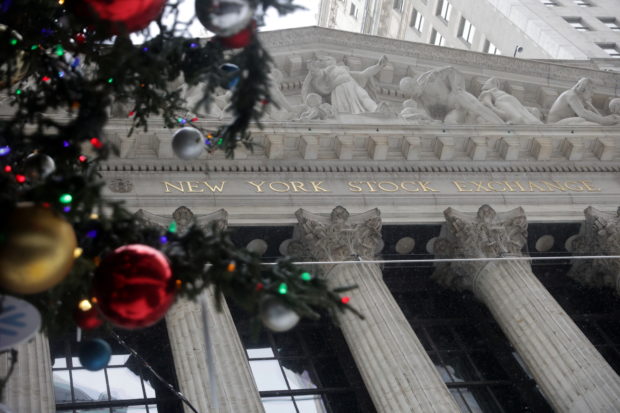
View of the NYSE building and tree decorations in the Financial District of Manhattan, New York City, New York, U.S., December 17, 2020. REUTERS/Jeenah Moon
NEW YORK -U.S. stocks edged lower on Tuesday in choppy trading after hitting record highs, as investors worried about the path of economic reopening and whether the Senate would authorize additional pandemic aid checks.
Modest gains in early trading brought stocks to an intraday record, but the advance evaporated after U.S. Senate Majority Leader Mitch McConnell blocked immediate consideration of the measure calling for an increase in stimulus payments from $600 to $2,000. Final passage of the proposal would require 60 votes and the backing of a dozen Republicans.
McConnell said the chamber would address the increased payments this week along with limits on big technology companies and election integrity.
McConnell’s comment comes a day after Democratic-led House of Representatives approved the move to bump up direct payments.
“The move by Majority Leader McConnell to not endorse the $2,000 disbursements turned equity markets from green to red around midday,” said Joseph Sroka, chief investment officer at NovaPoint in Atlanta.
“The plan that was originally signed is baked in. The question as to whether the bigger individual checks get passed is up for debate.”
The Dow Jones Industrial Average fell 68.3 points, or 0.22%, to 30,335.67, the S&P 500 lost 8.32 points, or 0.22%, to 3,727.04 and the Nasdaq Composite dropped 49.20 points, or 0.38%, to 12,850.22.
Volumes are expected to be light in the holiday-shortened week, which could lead to boost volatility. The S&P 500 is up 15.4% so far this year, with just two trading days left in 2020.
Wall Street’s three main indexes opened at new highs for a second straight session after Trump signed a $2.3 trillion fiscal bill that restored jobless benefits and averted a federal government shutdown.
More than 2 million Americans have been inoculated, helping investors look past a surge in infections that topped 19 million, with California, a major U.S. virus hot spot, likely to extend strict stay-at-home orders.
But a sharp drop in small cap stocks could mark concern surrounding the surge in infections causing a slower than hoped for reopening, according to Stephen Massocca, senior vice president at Wedbush Securities in San Francisco. The Russell 2000 small cap index was off 1.85% on the day, its biggest one-day percentage decline in a month.
Unprecedented monetary and fiscal stimulus measures, along with positive vaccine developments have helped the S&P 500 bounce back from a virus-fueled crash in March.
The benchmark index is up more than 10% for the quarter as investors have flocked to economically-sensitive stocks from the so called ‘stay-at-home’ plays on hopes of a recovery.
Intel Corp jumped 4.93% after Reuters reported activist hedge fund Third Point LLC is pushing the chipmaker to explore strategic options, including whether it should remain an integrated device manufacturer. [nL1N2J9139]
After rising as much as 2.6%, Boeing shares gave back earlier gains to close up 0.07% as its 737 MAX plane resumed passenger flights in the United States for the first time after a 20-month safety ban was lifted last month.
Snapchat owner Snap Inc climbed 6.15% after Goldman Sachs raised its price target on the stock on upbeat revenue growth prospects.
Volume on U.S. exchanges was 9.46 billion shares, compared with the 11.14 billion average for the full session over the last 20 trading days.
Declining issues outnumbered advancing ones on the NYSE by a 1.70-to-1 ratio; on Nasdaq, a 2.57-to-1 ratio favored decliners.
The S&P 500 posted 21 new 52-week highs and no new lows; the Nasdaq Composite recorded 83 new highs and 27 new lows.

